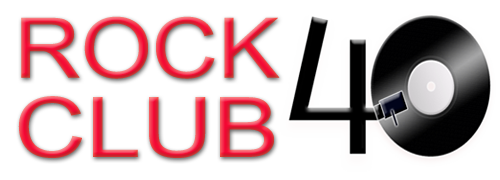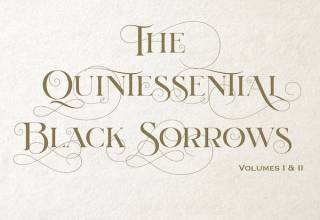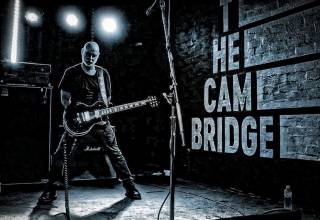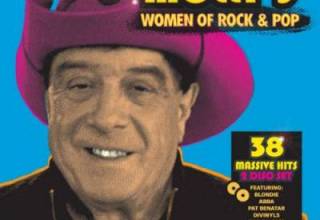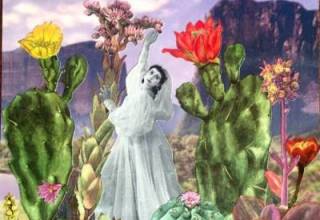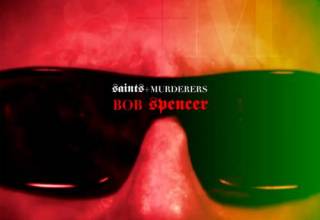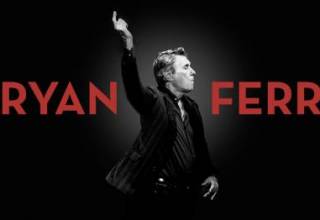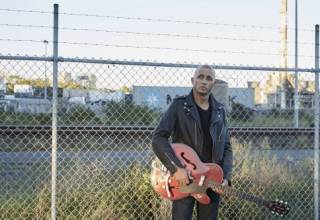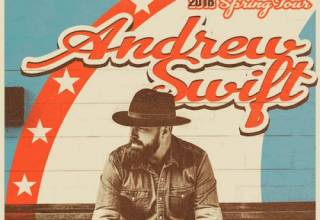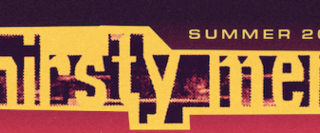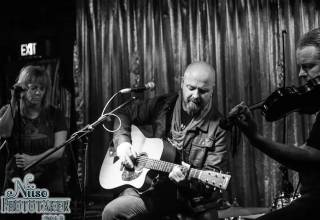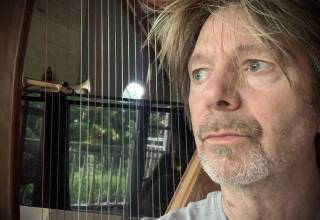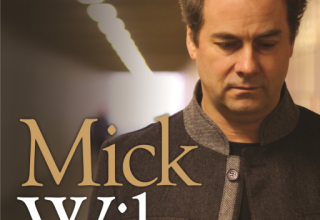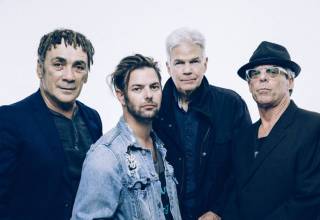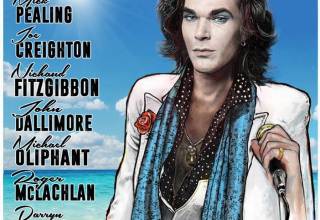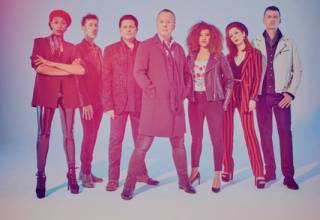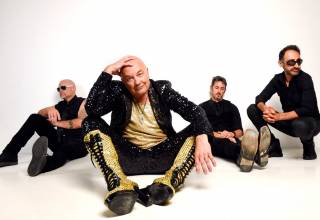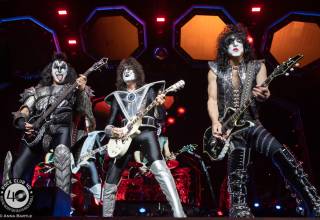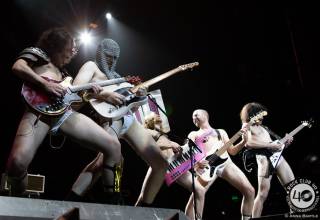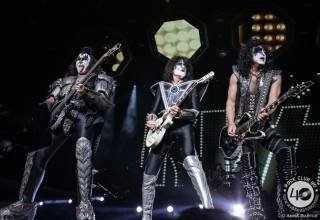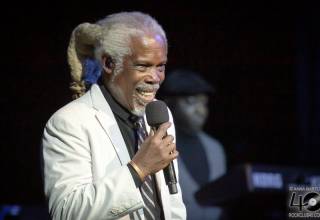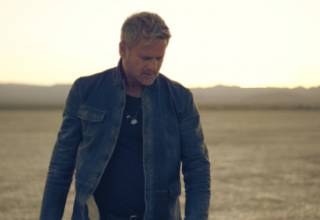Icehouse has long been one of this country’s favourite bands, with a long list of hits to their name and a well deserved reputation for putting on a more than impressive live show. The last few years have seen a return to those amazing live performances, much to the applause of their legion of fans (of which yours truly is one, I must admit) who have noticed something of a gaping hole in the local live music scene until recently. But Icehouse has well and truly returned, with a series of gigs in Melbourne, Brisbane and Sydney and hopefully many more to come. I had the great privilege of speaking to frontman Iva Davies recently about the band, the music and his rather diverse musical background and I discovered that Iva is, indeed, a man of many colours…
Last month the band performed a couple of reggae shows under the pseudonym Dubhouse. “That was a real hoot,” laughs Iva. “It was a mad idea but it was incredibly well received; unbelievably well received. The interesting thing was, in a nutshell, basically I had the mad idea to sort of turn the whole set into reggae which we managed to do with frightening ease really. Quite extraordinary how those songs translate into a completely different genre. We pumped up the band with three extra members so we had a guest vocalist and a brass section and added percussion. But that was a one-off really. We did one show at the Esplanade in Melbourne and one at a tiny little club in Sydney called The Oxford Art Factory. The interesting thing is that we’ve actually adopted a couple of those into the classic set, I guess we call it, just for a bit of fun. Nothing too intense and in fact the versions of the particular songs we’re doing are not actually reggae per se but just kind of stripped down versions of a couple of our classic songs.”
Iva says that they have also added quite a few songs that the band hasn’t performed for a very long time. “In fact, at least one song we haven’t played since 1990, which I won’t tell you about because it will take the surprise out of it,” he laughs. “And some of the earlier material as well. We had a couple of furious sets of rehearsals to get everybody’s brain back into the classics and to also get our heads around a fair content, I guess, that we haven’t played for a very long time.”
So it seems that audiences can expect a few surprises at these shows. “I should think so,” Iva agrees. “And it’s tricky because, of our long standing audiences, we have almost two distinct audiences and one audience kind of dates back to the Flowers album which of course was a very particular time and a very particular album and I guess when we were playing those songs in the late seventies and 1980 when the album came out, our audience was predominantly twenty two year olds; a lot of them basically university students. It was off the back, I guess, of the punk movement and it was quite a long time in relative terms – seven or eight years – when Man of Colours came out. Now that was a completely different audience. A lot of those were thirteen year olds, and sixteen year olds and so we had these two quite distinct periods and sort of everything in between so it’s interesting. Whenever I think about doing something from the Flowers album, I’m wondering whether we’re leaving behind all the people who joined us years later or whether they’ve gone back and studied that first album. That first album seems to be quoted very often as a kind of a highlight so I’m fairly confident that, even though people might have joined us around about the period of Man of Colours, a lot of those songs would have filtered through.”
Iva recalls the time that Icehouse was invited to play Homebake and feature the Flowers album. “Which we dutifully did,” he explains. “And as you can imagine, we hadn’t played an awful lot of that album for a very long time and the whole set was sort of dominated by that first album but the scary part of it was that the promoters and so on had said to me (because I had never been to a Homebake before) ‘Just be aware that the audience of Homebake are predominantly twenty year olds.’ Of course, by then, the Flowers album was thirty years old and I thought it was going to be an absolute disaster. We started playing to 20,000 – a lot of them twenty odd year olds – and my bass player kind of nudged me in the ribs and said ‘Check out how many of them are singing all the lyrics.’ In fact, that entire crowd sang the set of the Flowers album from beginning to end and most of them hadn’t even been born when that album came out!”
“I’ve got a twenty year old daughter and a seventeen year old son,” he tells me. “And what I’ve observed of them and their generation is that they have such incredible access to music these days because of the internet, iPhones and iPads and iPods in a way that is utterly different from when I was that age so it makes logical sense that they’re discovering loads of music (from earlier generations). I know that my son’s playlist, for instance, features things like Jimi Hendrix and Led Zeppelin and Pink Floyd and the Yardbirds and it’s quite extraordinary really that a seventeen year old would be listening to this sort of stuff.”
While the fans, of course, are always happy to hear their old favourites, I wonder if there any particular songs that the band themselves tire of playing or, indeed, any that they look forward to playing. “I never tire of ‘Great Southern Land’,” Iva admits. “Not only because of what it’s become and its place, I guess, in Australia’s consciousness but because it’s always been a very comfortable song to play. In fact, we always use it as our kind of sound check as it were to make sure that everything is in its right, proper place. It’s just one of those songs. Instead of being a struggle, which some of them are, it always feels like coming home in a strange sort of way. It’s a very settling thing to play.”
The band was doing quite nicely under the name Flowers so what exactly led to the decision to change the name to Icehouse?
“It’s quite a simple story,” he explains. “Because we worked for probably three years as Flowers live and had quite a lot of work, it was almost guaranteed that, by the time the first album came out (which was called Icehouse), we had a ready made audience who would buy the album and it was a very successful album. It was the largest selling debut album of any band at the time. But that, in turn, inspired a lot of international interest so we had record companies from overseas bidding for us and eventually signed an international agreement. Therefore, the plan was to release that album overseas and it was at that point that we struck a problem and the problem was very simple. A band name is like any kind of business name or trading name. Now that’s something that, as a twenty odd year old forming a band, you don’t take under consideration but of course we found out the hard way, as did a number of Australian bands. For example, Sherbet and The Angels weren’t allowed to use those names as trading names outside of Australia because somebody else had already claimed them. So we had a difficult choice which kind of turned out to be a blessing in disguise. We had to change the name of the band and our logic was that there were only two monikers that we were known by in Australia and New Zealand. We were known as the band Flowers and we were known by our first album name which is called Icehouse and therefore the logic of it was: Let’s adopt the album name.”
As Iva says, that was the turning point for the band. “We had a tour within Australia before we went off to attempt to conquer the world, which basically was in fact because of the change of name and it was Molly Meldrum on Countdown who did a special feature on the change of the name and he was in fact up in the snow resort I think in Victoria at the time, making the most of the concept of Icehouse and reputedly, that was the first time he ever wore the hat.”
Iva’s musical roots, as he tells it, came from a very odd place. “In fact,” he explains, “I grew up in the country. I grew up in regional NSW in Wagga Wagga and when I was very young – my father tells me I was only about five.My recollection is that I was a little bit older than that – I was awe struck by a parade. I don’t remember if it was a New Years parade but I heard this approaching sound and it turned out to be the Wagga St Andrews Heather Pipe Band which was, of course, a Scottish Pipe Band and I was so mesmerised that I absolutely hounded my parents to let me learn the bagpipes.” Iva’s peristence paid off. He did learn to play the bagpipes and actually marched with that band at the tender age of nine. “When I moved to Sydney at the age of about eleven and went to high school, the music teacher there basically said to me ‘I don’t think you should play the bagpipes; it’s a very unsociable instrument. My wife is an oboe teacher. We have an oboe in the cupboard. Now off you go and have lessons.’ I went to my first lesson on the oboe without even knowing what an oboe sounded like! But apparently I was very good at it. Around about that time also, I requisitioned my big brother’s acoustic guitar. He went off to work in London. He was in his late teens I think and I taught myself how to play the guitar so I had a completely parallel set of universes. One was studying classical music and the other was basically falling in with a couple of singer/songwriters who were a bit older than me who were part of the tail end of the folk movement, which I guess is most commmonly associated with the Vietnam protest movement. We’re talking about 1971 here. My two friends were shortly to be eligible for conscription to be sent to Vietnam so it was kind of a serious time for music really. There were massive rallies that we played at, all of which I thought was quite fun because I was only about fifteen and it was going to be a couple of years before I was eligible for conscription. Then of course conscription disappeared in 1972. But that was where I was introduced to popular music and I went on to be influenced by not only classic psychedelic rock like Pink Floyd but also the ‘Glam’ movement and ultimately of course, when the punk movement arrived, there was a kind of explosion as there was an explosion of technology and that was something that really interested me so Flowers ended up being a peculiar hybrid of a punk band with synthesisers.”
Iva’s early musical training was classical. A fact that he initially tried to keep hidden in the very early days of the band. “Because it was so at odds with what the fashion was at the time,” he explains. “And of course we’re talking about a period where The Sex Pistols had just blown up the establishment of rock ‘n’ roll and to admit to having any training at all would have been disastrous, I think! But the fact of the matter is that I was trained as an oboist and won my first scholarship to the Conservatorium when I was around about fourteen. By the time I was nineteen, I was in the Conservatorium Senior Orchestra and playing professionally. In fact, I was in the Orchestra for the very first Australian Opera staged in the Opera House. The Opera House wasn’t even really finished at that point but I had forgotten until, quite recently, my father had reminded me of that. He still had the programme. And of course the Opera House has just had an anniversary and I was involved in some of the interviews around that because, in the very early days of the Opera House functioning, I was actually involved and I was still a teenager.”
I imagine that would have been one of the highlights of your career? “Indeed it was,” he agrees. “In fact, I went on to play with the Sydney Symphony on the Concert Hall stage only a couple of years after that.” But Iva’s connection with the Opera House was destined to continue in a number of ways. “For example,” he recalls, “there was a peculiar piece of technology very early on called a ‘picture disc’. I don’t know if you’ve ever seen any of them but somebody worked out how to actually imprint a photo in to a piece of vinyl and a recording that I did of a Stravinsky Octet, believe it or not, which was performed in The Music Room at the Opera House, was recorded and I think became Australia’s very first picture record. I don’t think it sold anything,” he laughs, “but it was quite an obscure thing for that particular company to record. Nonetheless, somewhere or other, I’ve got a copy of it and then I went on to write two ballets for the Sydney Dance Company which were the Dance Company’s most successful ballets. One in 1985 called Boxes which was staged in the Opera House and it only ever was performed in the Opera House and one in 1995 ten years later, called Berlin which debuted in the Opera House and then travelled around the country.”
With such a diverse collection of projects and achievements under his belt, is there anything else that this multi talented artist aspires to accomplish in his career?
He ponders the question for a moment before answering. “I tend to sort of fall into things really,” he replies. “I mean, if I were to go back and catalogue what happened when we officially stopped touring around about 1994, then I’d have to conclude that, from there on for almost ten years, was a kind of series of happy accidents. I decided at that point that writing songs was too hard so I did a covers album and that album turned into The Berlin Tapes which in turn turned into the ballet, Berlin. It wasn’t designed as a ballet or even the basis of a ballet at the outset but it just evolved into that with a co-writer Max Lambert who was playing piano on The Berlin Tapes with me. Then of course, a number of other things happened. I submitted a song which became one of the Olympic themes and the same creative team which was David Atkins, Ignatius Jones and Max Lambert approached me completely independent of that. They were in the process of designing the millenium events in Sydney Harbour and said ‘We’ve got the Sydney Symphony Orchestra; we’ve got TaikOz, which is a Sydney based group of Taiko Japanese drummers; we’ve got this, we’ve got that and we want you to turn ‘Great Southern Land’ into a twenty five minute extravaganza which will lead up to the countdown. Now that took me nearly a year to put together, by the time we’d recorded it and so on. It was a massive job. And then it so happened that of the three and a half million people watching that performance, leading up to the countdown and fireworks, Peter Weir was watching his television set (he lives literally over the hill from where I do) and so in 2003, I got a phone call out of the blue from Bahia, Mexico where he was filming Master and Commander on location and he said ‘That piece of music that you did for the millenium; I want you to write a film score based on that style for my movie,’ so that of course changed into another epic job and then out of that, of course, I was approached by an English production company. They said to me ‘We’re doing a period piece. It’s going to be a two part television film; it’s the largest budget telemovie ever produced in Australia, called The Incredible Journey of Mary Bryant, based on the true story of a convict on the First Fleet.’ That was a massive job as well so one thing kind of kept bumping into another for many years.”
So Iva Davies has remained a very busy man and he doesn’t appear to be slowing down too much at the moment, with various Icehouse gigs around the country. “Icehouse is fairly organic,” he points out. “There are things happening all the time. For example, there are a number of discussions going at the moment about possible reprisals of the Dubhouse performance, the reggae band. It’s incredibly fun, I have to say. I’m not a massive officianado but reggae just makes you want to smile and dance. So it was great fun and any opportunity we had to do it again, I know the guys would love to, especially with the eight piece band. So that might surface at some point this year but things are fairly fluid and they always have been fairly fluid. We plan some things in advance but a lot of things just fall into place as well.”
But don’t expect any new material any time soon. That is not part of the agenda at this particular time. As Iva explains, performing is what is driving him right now. “I tend to be fairly concentrated with the writing process,” he tells me. “I always was. I guess I’m probably the antithesis of a writer like Paul Kelly, who seems to be incredibly prolific, inasmuchas every song I have written has been released. There is nothing in the vault and at the time when we were writing and touring album after album, I would simply sit down and write the quota and things were either strangled at birth or they ended up being released and that’s the way I work so, at the moment, I don’t have a particular project which disciplines me into that kind of mindset. I tend to have two completely different switches. One is I’m in performing mode and the other one is I’m in writing mode. And for the moment, the performing mode is the dominant one.”
by Sharyn Hamey
Copyright © 2014 Sharyn Hamey. All Rights Reserved
Tour Dates:
14 January – The Palms at Crown, Melbourne VIC
with special guests MODELS:
17 January 2014 – Southport RSL, Gold Coast QLD
Tickets available from the venue – (07) 5552 4200
www.southportrsl.com.au or Oztix – 1300 762 545
18 January 2014 – Eatons Hill Hotel, Brisbane North, QLD
Tickets available from the venue – (07) 3325 6777
with special guest MICHAEL PAYNTER
19 March, 2014 – Belmont 16’s Sailing Club
From venue (02) 4945 0888 www.16s.com.au
Thursday 20 March, 2014 – Rooty Hill RSL
From venue (02) 9625 5500 www.rootyhillrsl.com.au
Rottnest Island Rotto Live Concert Series
Hotel Rottnest – Sunday 23rd March 2014
Tickets from $79.90 through www.ticketmaster.com.au
